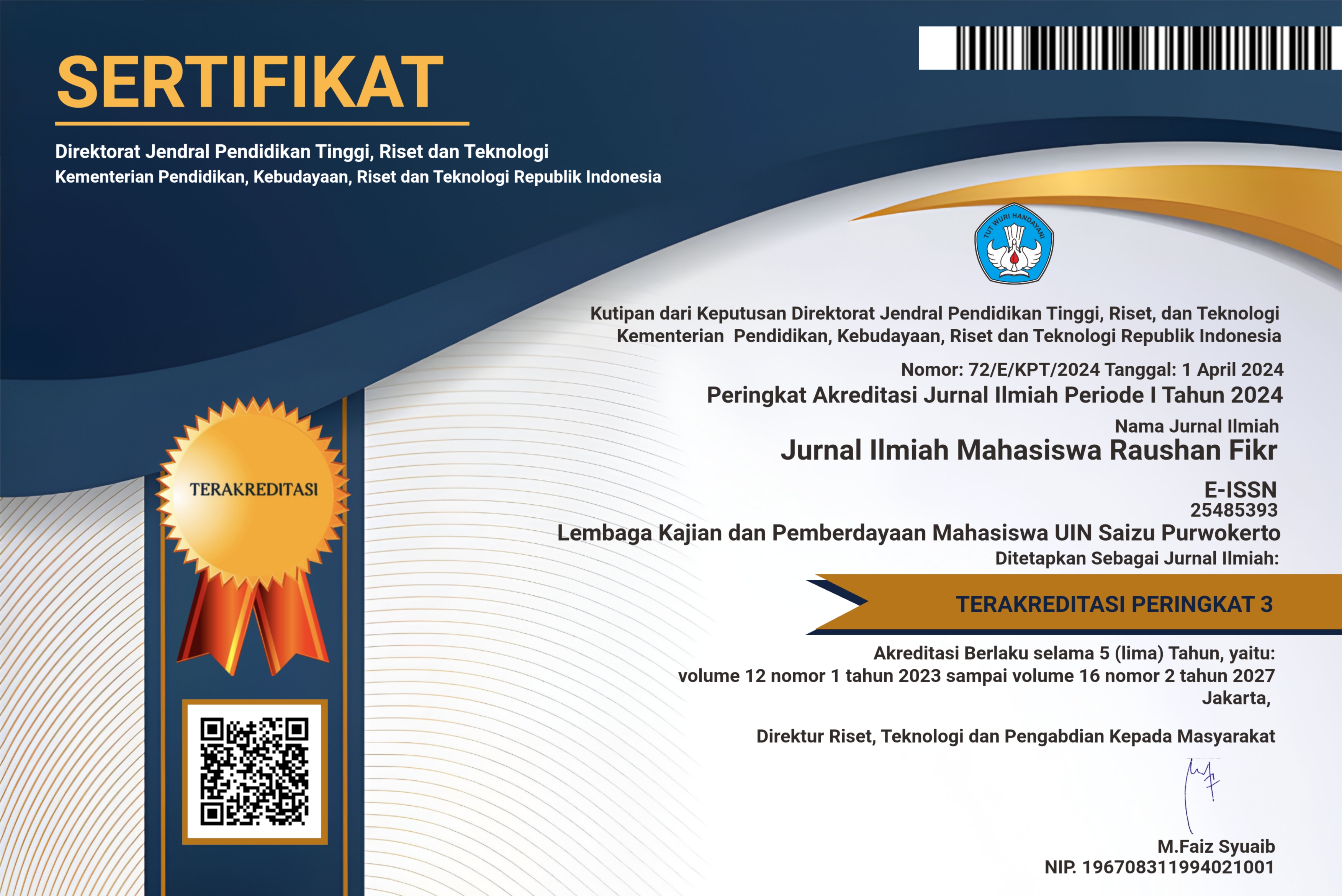AKTUALISASI MAKNA AL-TUHURU SHATRU AL-IMAN MELALUI BANK SAMPAH DALAM MENINGKATKAN KESEHATAN LINGKUNGAN
DOI:
https://doi.org/10.24090/jimrf.v8i1.3055Keywords:
Hadits, Enviroment, Waste BankAbstract
Indonesia as a country with largest Muslim population in the world should be a role model country in all aspects specifically for environmental hygiene. Hygiene in Islamic teachings is the main priority, even in a hadith mentioned hygiene is part of faith. This means that the level of faith in a Muslim can be measured one of them through the aspect of hygiene reflected in himself and his environment. However, this contradiction in actualization with the fact that Indonesia was in the second position of the world’s largest plastic garbage contributor and National Geographic data stated that there were four rivers in Indonesia, including the 20 dirtiest rivers in the world. This paper aims to analyze the actualization of the meaning of the hadith al-Tuhuru Shatru al-Iman through the Waste Bank as an effort to improve environmental health in preventing the risk of disease occurring and utilization of waste in the economic field to achieve Indonesia Golden 2045. This writing method uses literature review by integrating various literatures of general science and Islamic teaching values. Based on a variety of literature studies it was concluded that Waste Banks are one of the alternative solutions that are efficient in improving environmental health as an actualization of the meaning of Islamic teaching values. Through the Waste Bank the community gets more effective waste management education, and the community as a customer gets benefits in terms of health and economic aspectsDownloads
References
Al-Shiddieqy, M. H. (2009). Sejarah dan Pengantar Ilmu Hadis. Semarang: Pustaka Rizki Putra.
Asteria, D., & Heruman, H. (2016). Bank Sampah Sebagai Alternatif Strategis Pengelolaan Sampah Berbasis Masyarakat di Tasikmalaya (Bank Sampah (Waste Banks) as an Alternative of Community-Based Waste Management Strategy in Tasikmalaya). Jurnal Manusia dan Lingkungan, 23(1), 136. https://doi.org/10.22146/jml.18783
Azami, M. M. (2009). Hadis Nabawi dan Sejarah Kodifikasinya. Jakarta: Pustaka Firdaus.
Badan Pusat Statistik. (2017). Statistik Lingkungan Hidup Indonesia 2017. Badan Pusat Statistik/BPS Statistics Indonesia, 270.
Badan Pusat Statistik. (2018). Statistik Indonesia : Statistical Yearbook of Indonesia 2018. Badan Pusat Statistik/BPS Statistics Indonesia, 719.
ÄŒiÄková, H., Newton, G. L., Lacy, R. C., & Kozánek, M. (2015). The Use of FlyLlarvae for Organic Waste Treatment. Waste Management, 35, 68–80. https://doi.org/10.1016/j.wasman.2014.09.026
Damanhuri, P. D. E. (2006, April). Teknologi Pengelolaan Sampah Kota di Indonesia. Paper dipresentasikan pada Workshop Nasional Biokonversi Limbah, Universitas Brawijaya Malang. Diambil dari http://kuliah.ftsl.itb.ac.id/wp-content/uploads/2008/08/unbrawbiokonv-110406.pdf
Fatoni, N., Imanuddin, R., & Darmawan, A. R. (2017). Pendayagunaan Sampah Menjadi Produk Kerajinan. Dimas: Jurnal Pemikiran Agama untuk Pemberdayaan, 17(1), 83–96. https://doi.org/10.21580/dms.2017.171.1505
Ghufran, A., & Saharuddin. (2007). Islam dan Konservasi Lingkungan. Millah, VI, No. 2, 55–75.
Ilyas, M. (2008). Lingkungan Hidup Dalam Pandangan Islam. Jurnal Sosial Humaniora, 1(2). https://doi.org/10.12962/j24433527.v1i2.672
Iswanto, A. (2013). Relasi Manusia dengan Lingkungan dalam Al-Qur’an. Suhuf, 6(1), 18 (1-18).
Jambeck, J. R., Geyer, R., Wilcox, C., Siegler, T. R., Perryman, M., Andrady, A., … Law, K. L. (2015). Plastic waste inputs from land into the ocean. Science, 347(6223), 768–771. https://doi.org/10.1126/science.1260352
Kementerian Lingkungan Hidup dan Kehutanan. (2017). Sistem Informasi Pengelolaan Bank Sampah. Kementerian Lingkungan Hidup dan Kehutanan Indonesia.
Mardiana. (2013). Kajian Tafsir Tematik Tentang Pelestarian Lingkungan Hidup. Al-Fikr, 17(1), 13 (139-151).
Masburiyah. (2011). Konsep dan Sistematika Pemikiran Fiqih Sufistik Al-Ghazali. NALAR FIQIH: Jurnal Kajian Ekonomi Islam dan Kemasyarakatan, 3(1), 22 (109-130).
Nawawi. (2010). Syarah Sahih Muslim. Jakarta: Darus Sunnah Press.
Nugraha, A., Sutjahjo, S. H., & Amin, A. A. (2018). Analisis Persepsi dan Partisipasi Masyarakat Terhadap Pengelolaan Sampah Rumah Tangga di Jakarta Selatan. Jurnal Pengelolaan Sumberdaya Alam dan Lingkungan (Journal of Natural Resources and Environmental Management), 8(1), 7–14. https://doi.org/10.29244/jpsl.8.1.7-14
Perrot, J.-F., & Subiantoro, A. (2018). Municipal Waste Management Strategy Review and Waste-to-Energy Potentials in New Zealand. Sustainability, 10(9), 3114. https://doi.org/10.3390/su10093114
Prastyo, D., Purnomo, A. B., & Rahayaan, T. I. (2017). Pelaksnaan Program Bank Sampah Dalam Sistem Pengelolahan Sampah di Desa Jogodalu Kecamatan Benjeng Kabupaten Gresik, 01, 6.
Rahmasari, B. (2017). Kebersihan dan Kesehatan Lingkungan dalam Perspektif Islam. UIN Syarif Hidayatullah.
Rahmat. (2015). Implementasi Konsep Kebersihan Sebagian dari Iman di IAIN Raden Fatah Palembang. IAIN Raden Fatah Palembang, 1(1), 16.Rohmah, S. N. (2017). Konsep Kebersihan Lingkungan dalam Perspektif Pendidikan Islam. IAIN Salatiga.
Sahil, J., Al Muhdar, M. H. I., Rohman, F., & Syamsuri, I. (2016). Sistem Pengelolaan dan Upaya Penanggulangan Sampah Di Kelurahan Dufa- Dufa Kota Ternate, Jurnal Bioedukasi Volume 4 No (2), 10.
Selomo, M., Birawida, A. B., & Mallongi, A. (2016). Bank Sampah Sebagai Salah Satu Solusi Penanganan Sampah di Kota Makassar, 12(4), 9.
Song, H., Guziana, B., Mirmoshtaghi, G., Thorin, E., & Yan, J. (2012). Waste to Energy Scenarios Analysis Based on Energy Supply and Demand in Sweden. Unpublished, 3027–3035. https://doi.org/10.13140/2.1.4258.6561
Suara Pembaharuan. (2018, April 25). Bijak Tangani Plastik Dua Kota di Indonesia Produksi 1,3 Juta Ton Sampah, hlm. 18.
Suhendra, A. (2013). Menelisik Ekologi Dalam Al-Qur’an. ESENSIA: Jurnal Ilmu-Ilmu Ushuluddin, 14(1), 61. https://doi.org/10.14421/esensia.v14i1.750
Suherman, R. (2014). Upaya Penanggulangan Sampah oleh Dinas Kebersihan dan Pertamanan Kota Samarinda, 2 (1), 299–309.
Sumaji, M. A. (2008). 125 Masalah Thaharah. Solo: Tiga Serangkai.
Tibbetts, J. H. (2015). Managing Marine Plastic Pollution: Policy Initiatives to Address Wayward Waste. Environmental Health Perspectives, 123(4). https://doi.org/10.1289/ehp.123-A90
Utami, E. (2013). Buku Panduan Sistem Bank Sampah & 10 Kisah Sukses. Jakarta: Yayasan Unilever Indonesia.
Qardawi, Yusuf. (2001). Sunnah, Ilmu Pengetahuan dan Peradaban. Yogyakarta: Tiara Wacana Yogya.
Zuhdi, A. C. (2012). Krisis Lingkungan Hidup dalam Perspektif al-Qur’an. Mutawatir: Jurnal Keilmuan Tafsir Hadis, 2(2), 23 (140-162). https://doi.org/10.15642/mutawatir.2012.2.2.140-162
-
Downloads
Published
How to Cite
Issue
Section
License

This work is licensed under a Creative Commons Attribution-NonCommercial-ShareAlike 4.0 International License.
Authors who publish with this journal agree to the following terms:
- Authors retain copyright and grant the journal right of first publication with the work simultaneously licensed under a Creative Commons Attribution-NonCommercial-ShareAlike 4.0 International License that allows others to share the work with an acknowledgement of the work's authorship and initial publication in this journal.
- Authors are able to enter into separate, additional contractual arrangements for the non-exclusive distribution of the journal's published version of the work (e.g., post it to an institutional repository or publish it in a book), with an acknowledgement of its initial publication in this journal.
- Authors are permitted and encouraged to post their work online (e.g., in institutional repositories or on their website) prior to and during the submission process, as it can lead to productive exchanges, as well as earlier and greater citation of published work (See The Effect of Open Access).
















